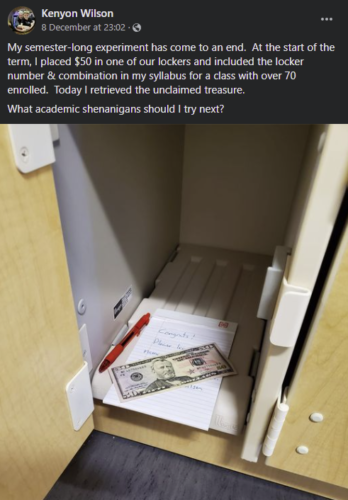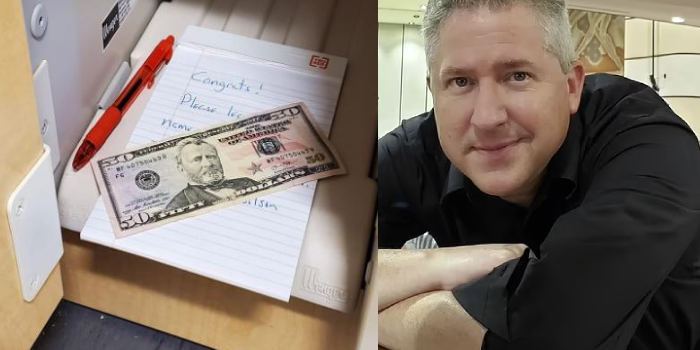Students are presented with various syllabuses detailing the contents of their classes at the start of each new semester. But do students read them fully? A professor in Tennessee put it to the test.
Kenyon Wilson, a professor at the University of Tennessee at Chattanooga, wanted to check if any of his students studied his music seminar syllabus completely. Unfortunately, none of the more than 70 students in the class appeared to have done so.

Professor Wilson claims to know this since he included the location and combination of a locker with a $50 cash prize on the second page of the three-page curriculum.
“Free to the first who claims; locker one hundred forty-seven; combination fifteen, twenty-five, thirty-five,” read the passage in the syllabus. However, after the semester finished on December 8, students returned home, leaving the money unclaimed.
“My semester-long experiment has come to an end,” Mr. Wilson wrote on Facebook, adding: “Today I retrieved the unclaimed treasure.”
He stated he had no idea how far his post had spread until a reporter from the Canadian Broadcasting Corporation approached him about making a piece about it. Professor Wilson explained that he intended to include the hidden clues to add excitement to the pandemic-stricken semester.

“Teaching in a pandemic, I’m trying to do creative things and, you know, make it interesting,” he said on Saturday. “The syllabus is a really dry document. I mean, it’s not supposed to be exciting to read, but I thought if my students are going through and reading it, I might as well reward them.”
Professor Wilson, the associate head of performing arts, believes the reward went unclaimed for the whole semester because if it had been found, the student “would not have kept quiet about it,” he added. He also set the combination lock at Midday at the start of the semester, and it stayed unchanged.
When Tanner Swoyer, a student studying instrumental music education, discovered the professor’s tweet about the money in the fine arts center locker, he felt “pretty dumb, pretty stupid.” Mr. Swoyer instantly texted his friends, who were equally “bamboozled,” mainly because he claimed Professor Wilson would do something like this.
Professor Wilson stated that his students had not failed him. However, he admitted that he would have missed the clues as well as a student.
“We read the parts that we deem important,” he said. “You know, what’s the attendance policy? What are the things I need to do to pass this class? And then there’s other stuff.”
“The other stuff” in this case also included a passage about what to do if a student tested positive for Covid-19.
“It’s something that I thought would be read and something on the first day of the semester I pointed out: ‘Hey, there are some new things in the syllabus. Make sure you, you know, make sure you catch them,’ and then no one did,” he said.

He’s received recommendations for next semester’s activities since his Facebook post. In addition, other academics have suggested that the following set of hints be turned into a collaborative activity.
“This is a class that has every music major in it, from freshmen to seniors,” Professor Wilson said. “Some suggested to make sure that this can only be solved with seniors and freshmen getting to know each other or something of that nature.”
He wasn’t sure if he’d do it again. “The jig is up,” he said. “There’s no way I can duplicate that.”


